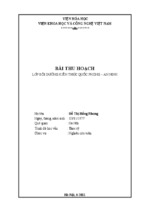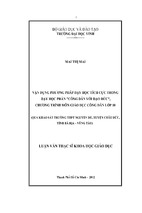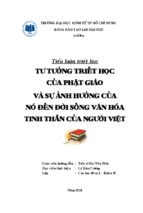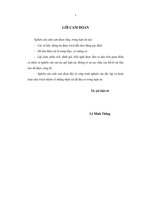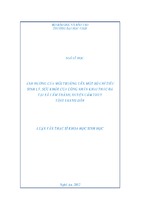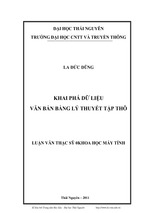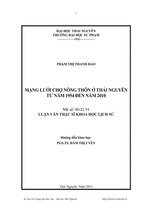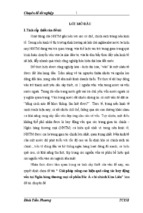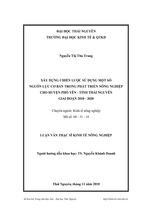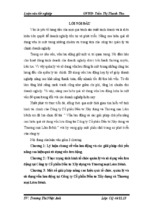1
MINISTRY OF EDUCATION AND TRAINING
HO CHI MINH CITY UNIVERSITY OF EDUCATION
--------------------------
ĐẶNG THỊ THÙY LINH
ADMINISTRATION OF HIGH SCHOOL
ACCREDITATION IN HO CHI MINH CITY
Major: EDUCATION ADMINISTRATION
Code: 62140114
SUMMARY OF DOCTORATE DISSERTATION
This dissertation was completed in : Ho Chi Minh City
Supervisors:1. Prof. Dr. Nguyễn Lộc ;
Ho Chi Minh City - 2014
2
Research completed at: Ho Chi Minh City University of Education
Supervisor
1. Prof. Dr. Nguyễn Lộc
2. Assoc. Prof. Dr. Trần Tuấn Lộ
1st counter-argument by: Assoc. Prof. Dr. Trần Khánh Đức
2nd counter-argument by: Assoc. Prof. Dr. Trần Thị Hương
3th counter-argument by: Assoc. Prof. Dr. Nguyễn Văn Đệ
The dissertation will be defended in the presence of the School’s
Dissertation Assessing Board, meeting at Ho Chi Minh City
University of Education on …………., ……..……am/pm
This dissertation can be found at the libraries:
1.Ho Chi Minh City University of Education
2.Ho Chi Minh City University of Technology and Education.
3.Ho Chi Minh City University of Social Sciences
3
INTRODUCTION
1. Rationale for the study
Accreditation in education in general and in secondary education in
particular plays a vital role in enhancing educational quality. Hence,
education accreditation is considered one of the most important
means of quality assurance, quality improvement, enhancing the
explanatory responsibility of the institutions to the authority and
society concerning the effectiveness, transparency of the resources
which are used by these institutions to provide their educational
services. However, there are still several drawbacks in the
administration of education accreditation in general and high school
accreditation in particular regarding accreditation policy, mechanism,
reviewer training, the agreement of institutions and society with
education accreditation. With this situation, the statement number
51-KL/TW on 29 Oct 2012 evaluated “The education and training
quality has not met the socio-economic development demand, and
has not kept up with the increase in size. (the relationship between
the increase in size and quality improvement in education has not
been solved properly).
Appreciating the role of administration in the improvement of
education quality, about basic and intensive innovation had a
solution “evaluate the education and training quality at national,
local, institutional levels and in accordance with international
programs/standards and then, based on these evaluations, proposals
of policies and solutions to enhance quality can be put forward.
Improve education accreditation system. Accredit institutions and
programs periodically. Announce accreditation results publicly”.
Since 2009, Ministry of Education and Training has
promulgated and implemented regulations on high school
accreditation. In Ho Chi Minh City, high school accreditation has
been carried out in compliance with the regulations of Ministry of
Education and Training and has achieved great success. However,
this activity has still faced many difficulties. Up to April 2013, there
are 186 high schools in Ho Chi Minh City and 102 of them are
public ones. According to the preliminary summing-up report of
accreditation of Ho Chi Minh City Department of Education and
Training, only 50% of public high schools completed self-study and
3,2% of them accomplished peer review. This was quite a modest
4
result compared to the designated goals.
Conducting a research to help improve the quality of education
in general and secondary education in particular has become an
essential task. In the past years, there have been many research into
education quality administration and education quality assurance, but
most of them focused on tertiary education and there were no
intensive research into high school accreditation as well as
accreditation administration in Ho Chi Minh City.
This was the reason why the researcher decided to choose to
study “The administration of high school accreditation in Ho Chi
Minh City” in her dissertation in Education Administration.
2. Purpose of the study: On the basis of studying the theories
and practical assessment of high school accreditation administration,
administrative solutions will be built to enhance the quality of high
school accreditation in Ho Chi Minh City.
3. Research hypotheses: There are several drawbacks in the
administration of high school accreditation in Ho Chi Minh City, for
instance, the planning, organizing, directing, implementing, as well
as assessing high school accreditation have not been carrying out
frequently and comprehensively, reviewers have not been
professionally trained. If solutions to administer this activity are built
appropriately based on scientific theories and practices of education
quality management, the quality of high school accreditation in Ho
Chi Minh City will be improved.
4. Research responsibilities: Review theoretical framework
of high school accreditation and high school accreditation
administration; Investigate and assess high school accreditation and
high school accreditation administration in Ho Chi Minh City;
Develop solutions to administer high school accreditation in Ho Chi
Minh City; Conduct experiment for one solution and test the
necessity and feasibility of suggested solutions to administer high
school accreditation in Ho Chi Minh City.
5. Delimitations
About the types of high schools: According to Ho Chi Minh
City’s Department of Education and Training’s statistics in 2012,
there are 186 high schools in Ho Chi Minh City in which 102 are
public high schools and 84 are private ones. This study only focused
on the accreditation, accreditation administration and solutions to
5
administer accreditation among public high schools which are under
the administration of Ho Chi Minh City’s Department of Education
and Training. Private high schools or high schools which have
foreign factors (teaching, studying, testing based on foreign
programs) were excluded from this study. About the solutions: this
research only studied the administrative solutions for high school
accreditation at the city/local level (Department of Education and
Training, high schools) and not at national levels (Ministry of
Education and Training, Central). About the scope of experiment:
Experiment the feasibility and necessity of solutions to develop the
training programs and organize reviewer training topics for high
schools’ self-study and peer review. About timing: from 2010 to
2014
7. Methodology
The system approach was chosen to study high school
accreditation and high school accreditation administration.
Accreditation is a factor of education administration in general and
secondary education administration in particular. Accreditation has a
close relationship with other educational activities and contributes to
the quality management of high schools.
The practical approach was also chosen to investigate high
school accreditation and high school accreditation administration.
Practical needs in social and cultural life as well as in other activities
are all related to education. Education quality should meet learners’
needs, hence accreditation should base on learners’ needs to develop
quality evaluation standards/criteria.
The historical-logical approach was used as well. All activities
in high school accreditation continuously change and develop in the
historical condition and circumstances of our country and our
education system. Hence, the development of administrative
solutions to manage high school accreditation activities should be
placed in the general development orientation of Ho Chi Minh City
and the educational development of the whole country.
This study used the targeting approach, too. All activities in
this research aimed at studying high school accreditation theories and
practices, then solutions to administer and improve high school
accreditation quality in Ho Chi Minh City were developed
accordingly.
6
Research instrumentation
Theoretical methodology: Analyzing, synthesizing research on
quality management, quality evaluation, education accreditation in
general and high school accreditation in particular. Studying,
analyzing theories of education administration and high school
accreditation administration. Analyzing the current set of standards
on high school quality evaluation. Studying theoretical framework by
systematizing, analyzing and synthesizing research relating to the
topic.
Questionnaire: The purpose of questionnaire was to collect
subjective, precise, reliable statistics and opinions about
accreditation and high school accreditation administration in Ho Chi
Minh City.
The contents of questionnaire were: Investigating self-study
and peer review activities of high schools. Investigating the
administration of self-study and peer review activities through the
planning, implementing, directing and inspecting self-study and peer
review activities of high schools of Ho Chi Minh City Department of
Education and Training. Investigating the needs for professional
training in accreditation and assessing the effect of accreditation on
high school quality improvement. Examining the necessity and
feasibility of the content of high school reviewer training topics, and
at the same time, studying the solutions’ necessity and feasibility.
Population: Administrators of the Department, high schools’
administrators and teachers; Instrument: questionnaires on high
school accreditation and high school accreditation administration in
Ho Chi Minh City.
Interviews
Purpose: The interviews aimed at gather further information
about high school accreditation and high school accreditation
administration. The contents of interviews: Interviews of high
school principals were about the direction, implementation,
inspection of high school accreditation activities of the schools and
Ho Chi Minh City’s Department of Education and Training. The
interviews were also about the advantages and disadvantages they
had during the process of implementing high school accreditation.
7
Population and instruments: Population: administrators at
Department level, together with high school’s leaders and teachers.
Instruments: interviewing forms for high school’s principals.
Purpose: The aim of method was to investigate the
administration activities of high school accreditation at ministerial
level, departmental level and at school level through their directing
documents.
Contents: analyzing, synthesizing all legal documents of
direction from administration offices about accreditation. Studying,
analyzing, evaluating, synthesizing all the records of self-study, peer
review, recognition of high school quality in Ho Chi Minh City.
Studying, analyzing, synthesizing all high schools’ year-end reports,
reports on teaching and learning activities, financial activities, extracurricular activities…
Expert method
Purpose: This method aimed at collecting opinions’ of experts
in education administration, education quality management,
especially experts in high school accreditation. Contents: Talking
and asking for their opinions on high school accreditation’s set of
standards and process of organization, organization of self-study and
peer review activities of high school accreditation… Population: 3
experts in education accreditation and 5 experts in education
administration. Instruments: talking directly to ask for opinions using
expert’s interviewing forms.
Brain Stormming Method
Purpose: this method aimed at studying experiences of other
provinces and cities in the administration of high school
accreditation as well as experiences of some countries about
accreditation and accreditation administration. Contents:
Exchanging managing experience in high school accreditation
administration with other provinces and cities’ Departments of
Education and Training. Studying international experiences in
accreditation through the participation of international conferences in
Vietnam and in other countries.
Population: some managing experiences in high school
accreditation from Hà Nội, Sóc Trăng Province, Tây Ninh Province.
Instruments: observing and exchanging information directly.
Experiment method
8
Purpose: this study used experiment method to prove that the
solutions developed were theoretically and practically suitable for
high school accreditation in Ho Chi Minh City. The experiment also
confirmed the scientific hypothesis that if feasible solutions were
developed and carried out appropriately, the quality of high school
accreditation in Ho Chi Minh City would be improved. Contents:
Conducting an experiment on the solution “Developing reviewer
training programs and organizing peer reviewer training topics for
self-study and peer review activities
Population: some administrators and high school teachers in
Ho Chi Minh City. Instruments: developing the content of the
training topics and organizing the training topics. Measuring and
assessing learners’ achievements in terms of knowledge, skills,
attitude before, during and after the training based on assessment
criteria in Appendix 5 and Appendix 6. Moreover, an experiment on
the necessity and feasibility of the contents of the high school
reviewer training topics was also conducted through obtaining
experts, administrators, high school teachers’ opinions.
Using mathematics for data analysis: This research used
mathematical statistics techinique to calculate and analyze data from
questionnaires and data and information collected from other
research methods
8. Scientific and practical significance of the research
8.1. Theoretical significance
The research has contributed to the development of theories of
education accreditation, in general, and high school accreditation, in
particular. The research has formed some core concepts such as
quality, education quality, secondary education quality, accreditation,
education accreditation, high school accreditation, administration,
education administration, quality management, high school
accreditation management/administration. These concepts closely
relate to each other, affect each other mutually and create the basic
theoretical background on which the researcher based to intensively
analyze the features of high school accreditation of which the fivestep process plays the most important role, including1. self-study,
2.peer review registration,3.peer review, 4. quality accreditation and
5. Maintaining, overcoming, improving quality after peer review.
The steps of the process must be carried out in accordance with a set
9
of standards of high school accreditation. On the basis of
administration aim and administration function’s approach, the
researcher has profoundly analyzed the aims and administration
functions of high school accreditation through the stages of planning,
implementing, directing, inspecting the accreditation activity of high
schools.
8.2. Practical significance:
Applying the above-mentioned theories to evaluate the basic
issues of the situation: the accreditation of high schools through
stages of self-study and peer review according to standards and the
administration of high school accreditation through the stages of
planning – organizing – directing – inspecting in which the
accreditation professional training is the most important factor of the
organization. The research also analyzed in-depth the contents of
accreditor training programs as well as high school reviewers’ ability
at present. The research identified views on high school accreditation
administration through factors such as decentralized administration,
awareness, reviewers, standards, policies…
In order to overcome the drawbacks of high school
accreditation administration in Ho Chi Minh City, at the same time,
based on theoretical framework, the researcher has recommended 4
groups of solutions: 1. Developing reviewer training programs and
organizing peer reviewer training topics for self-study and peer
review activities; 2. Managing self-study activity; 3. Managing peer
review activity; 4. Applying information technology and creating
policies to support high school accreditation. The self-study and
peer review can only be successful as expected when reviewers are
able to overcome the difficulties he/she has during his/her work.
Obviously, reviewers play a vital role in enhancing the effectiveness
of self-study and peer review activities. Reviewers who are trained
professionally and appropriately can participate in self-study
activities at his/her own school and peer review activities, thus, the
solution of reviewers will serve both purposes: self-study and peer
review.
The three above-mentioned significances will enrich the
theories and practices of high school accreditation in particular and
accreditation of education system in Vietnam in general.
9. Structure of the dissertation
10
Introduction; Chapter 1. Theoretical background of high
school accreditation administration; Chapter 2. The education
accreditation and high school accreditation administration in Ho Chi
Minh City in the period of 2010-2014; Chapter 3. Solutions for high
school accreditation administration in Ho Chi Minh City;
Conclusion, Recommendations; Researcher’s other studies
relating to the dissertation; References; Appendices
Chapter 1: THEORETICAL BACKGROUND OF HIGH
SCHOOL ACCREDITATION ADMINISTRATION
1.1. Overview
Research on high school accreditation process.
Elain El Khawas (2001) - Accreditation in the USA:origin,
developments and future prospect. LazrVLSCEANU, Laura
GRÜNBERG, and DanPÂRLEA (UNESCO 2007) - Quality
Assurance and Accreditation: A Glossary of Basic Terms and
Definition. Janet Fairman, Brendra Peirce và Walter Harris of Center
for Education and Human Development, University of Maine, the
USA (2009) - High school accreditation in Maine: Perception of
cost and benefits. Judith S. Eaton (2011) - U.S.Accreditation:
Meeting the Challenges of Accountability and Student Achievement.
Research on the implementation of self-study and writing
self-study reports based on educational accreditation standards.
ASEAN University Network – Quality Assurance Guidelines -2009:
Manual for the implementation of the guidelines of ASEAN. Nguyễn
Thị Thanh Phượng with her doctoral dissertation in Higher
Education Administration “Reaffirmation of accreditation and
quality improvement as a journey: A case study” at University of
Texas, the USA.
Research on external review and quality recognition based on
accreditation standards. Nguyễn Thị Thanh Phượng (2005)
conducted a profound study of external review in a particular
accreditation process at United States Sigma University. Janet
Fairman, Brendra Peirce, and Walter Harris (2009) also described the
external review techniques very carefully. According to this group of
authors, members of the Off-Site Review Committee had at least
five-year experience in education and they were also from other
secondary institutions/ high schools
11
Educational accreditation administration in some countries.
Accreditation of an institution in general and accreditation of a high
school in particular is a new activity, not only in Vietnam but in
countries which have a highly developed education system as well.
The foundation and administration of accrediting agencies depend on
each country.
High school accreditation administration in the USA
High school accreditation administration in Canada
Accreditation administration according to Asean
University Network
Domestic research
Research on high school accreditation process. Trần Khánh
Đức (2010) with his study “Education and Human Resources
Development in the 21st century”. Nguyễn Việt Hùng (2000) with his
ministerial research “Studying and developing accreditation process
for higher education institutions”, hosted by the Institute for
Research on Educational Development.
Research on self-study’s organization and implementation and
writing self-study reports based on accreditation standards.
Trần Khánh Đức (1995), headed the scientific research of
Institute for Research on Educational Development (now: The
Vietnam Institute of Educational Sciences) “ Conducting a trial on
technical and vocational educational accreditation along with other
countries in Greater Mekong Subregion”. Ministerial scientific
research code B2004-80-06 “Developing criteria system to evaluate
education quality of high schools and implementing testing in several
provinces and cities” (hosted by The Vietnam Institute of
Educational Sciences) headed by Nguyễn An Ninh introduced a
methodology overview of high school quality evaluation , and
developed a criteria system for high school quality evaluation. Lê
Đức Ngọc (2009) “ Overview of accreditation and secondary
education quality assurance”. Nguyễn Mạnh Cường (2009) with his
doctoral dissertation “Developing high schools according to effective
school views” at University of Education, Vietnam National
University, Hà nội.
Research on peer review and recognition of quality according
to accreditation standards. Phạm Thành Nghị (2000) in his research
“Higher education quality management” mentioned the concept of
12
“accreditation” or quality recognition. Nguyễn Đức Chính (2002) in
his work “ Accreditation in education” presented clearly concepts
relating to “Quality accreditation”.
1.2. Basic concepts
Quality, education quality, secondary education quality
This research has approached secondary education quality
concepts in accordance with UNESCO’s points of view.
Accordingly, education system is usually described through basic
factors such as : Socio-economic condition; Education’s principles
and goals; Priorities and concerns; Laws and policies; Learners and
educators. These four factors are combined to form a framework
consisting of four basic factors which is called CIPO model (Context
– Input – Process – Output).
Accreditation, education quality accreditation, secondary
education quality accreditation.
According to UNESCO (2007), the concept of education
quality accreditation is defined as a process consisting of self-study,
peer review and recognition of a quality level of an institution based
on standards set by an educational administration agency./office
The Ministry of Education and Training (2012) defines
secondary education quality accreditation as an evaluation activity
(including self-study and peer review) to identify the level of which a
high school meets the education evaluation criteria and accredit one
which conforms to the education quality standards of a government
administrative agency. The concept of the Ministry of Education and
Training is relatively similar to UNESCO’s concept and this is also
the concept which was chosen for the research.
Administration, educational administration, education
quality management
Educational accreditation administration
High school accreditation administration is a process in
which the administrators deliberately affects high school
accreditation activity through the planning, organizing, directing,
inspecting, supervising the self-study, peer review, accreditation,
granting of accreditation certificates according to standards set by
educational administrative agencies in order to improve secondary
education quality.
1.3. High school accreditation
13
1.3.1. Legal basis for high school accreditation
Legal documents on high school accreditation; Other
standards for high schools
1.3.2. Purposes and principle of high school accreditation.
High
school
accreditation
has
two
purposes:
(1)
accrediting/recognizing institutions or programs which meet required
standards; (2) supporting, giving motivation for improving programs’
quality as well as the quality of the institutions. According to
Educational Law 2009, principles of high school accreditation are
independent, subjective, law-abiding, genuine, public and
transparent.
1.3.3. Process of high school accreditation
High school self-study and transparency in self-study; High
school peer review; Recognition
1.3.4. Standards, criteria, indices in high school accreditation
1.3.5. Ministry of Education and Training’s Accrediting
standards for high school
Standard 1: Organizing, managing schools (10 criteria, 30
indices); Standard 1: Administrators, teachers, employees, students
(5 criteria, 15 indices); Standard 3: Learning facilities and equipment
( 6 criteria, 18 indices); Standard 4: Relationship between schools,
families and society (3 criteria, 9 indices); Standard 5: Educational
activities and educational outcomes (12 criteria, 36 indices).
Analyzing the standard set according to Circular 41 based on CIPO
model, there are 10 input criteria, 6 process criteria, 3 output criteria,
12 context criteria.
1.3.6. Reviewers: are people who practice in domains relating
to educational accreditation when qualified and meeting professional
conditions according to Ministry of Education and Training’s
regulations on reviewers.
1.4 High school accreditation administration
1.4.1. Educational administrative decentralization; 1.4.2
Administrative decentralization and administrative contents of high
school accreditation; 1.4.3 Administrative functions of high school
accreditation
CONCLUSION FOR CHAPTER 1
Most researches were about higher education accreditation
and few of them were researches into secondary education
14
accreditation, especially accreditation administration. On the basis of
affirming the rightness of some concepts, definitions, quality
management models, this research has proposed a high school
accreditation process as well as a process to administer this activity.
The research has also clearly stated concepts of quality, education
quality, accreditation, education quality accreditation and on the
basis of these concepts, has developed concepts of high school
accreditation and high school accreditation administration.High
school accreditation administration is a process in which the
administrators deliberately affects high school accreditation activity
through the planning, organizing, directing, inspecting, supervising
the self-study, peer review, accreditation, granting of accreditation
certificates according to standards established by educational
administrative agencies in order to improve secondary education
quality. The research has also developed a high school accreditation
process and a process to administer this activity through its
administrative functions. Research has shown that the process has
had a positive effect on the improvement of education quality at high
schools in Ho Chi Minh City. The research has also established a
high school accreditation administration’s theoretical framework
which can be used as a basis for the investigation and evaluation of
this activity in the next chapters. High school accreditation
administration is a completely new research in comparison to other
previous researches in Vietnam as well as in other countries.
CHAPTER 2. EDUCATIONAL ACCREDITATION AND
HIGH SCHOOL ACCREDITATION ADMINISTRATION IN
HO CHI MINH CITY
2.1. Overview of high schools in Ho Chi Minh City
Ho Chi Minh City has proved that it is a high-quality center for
education and training in Vietnam. Human resources education and
training has developed greatly: the training size grows every year,
there are various types of training, and facilities are invested heavily.
The number of schools of different levels in Ho Chi Minh City has
risen considerably along with the development of economy.
However, quality of schools has not met the huge increase in
number. Thus, schools need to be accredited in order to enhance their
quality.
2.2.1 Survey sample and data analysis convention
15
Questionnaire
Participants
Number of Ratio
questionnaire
Administrators of Department of 20
3%
Education and Training
High school administrators
456
73%
High school teachers
145
24%
Total
621
100%
The total numbers of participants in each school consisted of
all members of institutional self-study committee (hội đồng tự đánh
giá của nhà trường (principal, assistant principals, union’s president,
committee’s secretary, youth association’s assistant, deans, some
teachers). Below is the list of 51 high schools (making up 50% of the
total number of public high schools at the time of studying)
participating in the research.
Interviews, collection of experts and educational
administrators’ opinions + Collection of experts and educational
administrators’ opinions: 9 experts in educational administration and
educational accreditation were interviewed. Administrative
experience in educational accreditation from other Departments of
Education and Training in Sóc Trăng Province, Tây Ninh Province,
Hà Nội was collected.
+ Interviews of high school administrators and teachers in
Ho Chi Minh City: 16 principals of high schools which had
participated in self-studies , peer reviews and were recognized
according to set of standards were interviewed (making up 100% of
the total number of principals of high schools participating in peer
reviews at the time of studying). 16 secretaries of institutional selfstudy committees of high schools which carried out self-studies and
peer reviews (making up 100% of the total number of committee’s
secretaries of high schools participating in peer reviews at the time of
studying) were interviewed. 23 principals of high schools which had
not completed self-study reports (making up 50% of the total number
of principals of high schools which had not completed self-study
reports at the time of studying)
16
High schools’ documents about self-study and peer review
activities: there were 57 self-study documents (making up 100% of
the total number of high schools’ self-study documents at the time of
studying), 16 external review documents from 16 high schools’
external review committees (constituting 100% of the total number
of external review documents at the time of studying).
Ministry and Department’s administrative documents about
high school accreditation: 31 State, Ministry and Department’s
directing documents. 17 directing documents of Ho Chi Minh City
Department of Education and Training about high school
accreditation (making up 100% of documents at them time of
studying). All self-study and peer review’s professional training
documents from the Ministry of Education and Training and
Department of Education and Training about high school
accreditation.
2.2.2. Data analysis convention
2.3. High school accreditation in Ho Chi Minh City
2.3.1. Self-study activity at high schools according to
standards: The implementation of self-studies at high schools
according to set of standards; Reporting high school self-studies
according to standards; 2.3.2. External review activity at high
schools according to standards; Human resources for external
review committees; External review activity; External review
committees’ competence; 2.3.3. Maintaining and improving quality
after external reviews
2.4. The administration of high school accreditation of Ho
Chi Minh City’s Department of Education and Training.
2.4.1. Planning high schools’ self-studies and external
reviews of the Department of Education and Training; 2.4.2
Organizing and implementing high schools’ self-studies and
external reviews of the Department of Education and Training;
2.4.3 Directing the implementation of high schools’ self-studies
and external reviews of the Department of Education and
Training; 2.4.4 Inspecting and Evaluating self-studies and external
reviews of the Department of Education and Training
2.5. Professional training about high school accreditation
2.6. Evaluating the effects of accreditation on quality
improvement
17
2.7. General assessment of strengths and weaknesses of the
administration of high school accreditation in Ho Chi Minh City
2.7.1. Strengths
The Ministry of Education and Training and Ho Chi Minh
City’s Department of Education and Training have issued sufficient
legal documents as well as professional documents to direct the
implementation of high school accreditation in Ho Chi Minh City.
The ministerial and departmental directing documents are quite
comparable/appropriate to the theories as well as the reality of high
school accreditation in Ho Chi Minh City and in Vietnam.
High school accreditation has become an educational quality
management activity as regulated in the Educational Law.
Preliminary results of accreditation have confirmed the rightness of
accreditation as well as proving that it is a measure to improve high
school’s quality. High school accreditation has supported the
Department of Education and Training administer high schools
closely and comprehensively. Accreditation has also pushed high
schools to improve their conditions in order to assure their quality.
Accreditation has helped to develop quality culture in schools,
showing their effort for quality and avoiding formalism in which
schools run for quantity and try to deal with (cover everything from)
their supervisors. It is easier for schools which have good conditions
to assure quality to participate in self-studies and then register for
external reviews. The decentralization to the City’s People’s
Committee or Head of Department of Education and Training to sign
accreditation certificates has shown the decentralization in
administration from the central to the local governments.
High school accreditation has aided schools to evaluate their
situation exactly through the set of standards. Participating in
external reviews has also helped schools look back themselves
objectively with the consultancy and support of external review
committees who are always willing to assist their colleagues.
External review committees have also learned countless experience
from schools regarding management and professional knowledge.
Through accreditation, schools’ members as well as external reviews
committees have had chances to practice their skills for assessment
and evaluation of educational quality.
2.7.2. Weaknesses
18
+ About reviewers: In order to perform the administrative
mechanism of accreditation, reviewers who are professionally trained
to conduct accreditation reviews are needed. At present, reviewers
are school members who work as administrators at their schools.
Therefore, it is usually difficult to appoint them as reviewers.
Reviewers’ competence (for self-studies or peer reviews) has not met
the requirements. Particularly, their ability to argue and write selfstudy reports as well as external review reports is not good enough.
Thus, it is necessary to have intensive training programs for
reviewers.
+ About high school accreditation administration: High
schools’ awareness of accreditation: some high schools have not yet
realized the importance of quality to their survival. Public schools
have still depended completely on the control of their authority such
as 10th grade enrollment, budget, teacher recruitment, facility
development, equipment purchases… so they are still passive. Some
principals do not want to conduct accreditation because it requires a
lot of hard work and efforts. Procedures and techniques for writing
self-study reports: lack of procedures and advanced techniques to
organize and implement self-studies as well as writing self-study
reports at high schools.
+ About high schools’ external reviews: Procedures and
criteria for inspecting external peer reviews: lack of inspecting
procedures and assessment criteria for external reviews. Results of
external reviews from external reviews committee are submitted
directly to the Director of Department of Education and Training but
not through inspecting units. Chairs of external review committees:
lack of criteria to train and select chairs of external review
committees, particularly, criteria for knowledge, skills, attitude of
chairs of external review committees. Chairs of external review
committees have not been trained for external review team
management.
+ About financial mechanism: lack of proper policies for high
school which have conducted accreditation or been accredited,
hence, lack of encouragement. There is no solution and sanction for
high schools which have not carried out self-studies. Expenses for
accreditation are mainly from state budget rather than from other
resources, so they are really limited.
19
+About organization and decentralization: independent
accrediting agencies have not been established, the decentralization
for the Department of Education and Training to organize, administer
and implement high school accreditation is just the start of the
introduction of accreditation to schools. In the future, accrediting
agencies independent from the Department of Education and
Training will have to be founded (separating professional
administration from state administration offices for education). At
present, the Director of the Department of Education and Training is
assigned to administer high school accreditation, from organizing
self-studies, external reviews and recognizing high schools that meet
established standards. The Director of the Department of Education
and Training signs and grants accrediting certificates and this leads
to the situation of being both a “footballer and a referee” , thus, it is
not independent and not objective.
+ About the standards for evaluation of high school
quality: The standards for evaluation of high school quality are
illogical and impractical. Specifically, the set of standards for
evaluation of high school quality, which has been adjusted 3 times, is
still being modified greatly. However, it needs more changing to fit
Ho Chi Minh City’s situation. Because this set of standards is used
for all high schools in Vietnam, it is necessary to have flexible
criteria for each area and region. This set of standards does not have
criteria for missions and visions of high schools. That is why there
are some schools which have met accreditation standards but have
still not but their specific characteristics have not been assessed.
Since the set of standards mainly evaluates the schools, there are
only few criteria for evaluating curriculum and textbooks and
because curriculum and textbooks will need reforming after 2015,
high schools which meet accreditation standards will not meet
educational quality.
According to Circular 42 “Educational accreditation aims at
helping institutions to identify the level at which they meet the
educational goals in each stage/period…”. However, this is just
theoretical (rather than practical) because it is difficult to identify
school’s goals according to school’s regulations due to the fact that it
is impossible to measure the goals/the level. Secondary education’s
curricula are too theoretical, high school students spend much of
20
their time dealing with exams and tests, especially the university
entrance examination. Schools which have more students passing the
university entrance examination are considered to be ‘good-quality’
by students, students’ families and society. Therefore, if a school
which is accredited but the number of students who has passed the
entrance examination is low will not be chosen by students and their
parents.
In recent years, high school accreditation has been
implemented widely all over the country. The Department of
Education and Training of Ho Chi Minh City has also carried out this
mission according to the Ministry of Education and Training’s
direction and made this activity a common tasks of education.
Through practical implementation, high school accreditation has
proved that it is a solution to enhance high schools’ quality. The
research has investigated and evaluated high school accreditation
through activities such as self-studies, external reviews, maintaining
and improving quality after external reviews. The research has also
analyzed in-depth and evaluated the administration of the
Department of Education and Training through its administrative
functions. Moreover, the research has analyzed and evaluated
reviewer training activity at present. The research has especially
evaluated the effect of accreditation on quality improvement. The
strength of high school accreditation administration in Ho Chi Minh
City is that the planning, organizing, implementing, directing and
inspecting of self-studies and external reviews have been carried out
exactly in accordance with the accreditation process. 50% of high
schools have carried out self-studies and 10% of high schools have
conducted external reviews. The weakness of high school
accreditation administration in Ho Chi Minh City is that there are no
programs and organizations that train reviewers to meet practical
needs. There is also a lack of process and advanced techniques to
conduct self-studies and external reviews. Information technology
has not been applied to the administration of high school
accreditation. High schools which are accredited have not received
any special treatment and have had no international cooperation in
this field.
CHAPTER 3: SOLUTIONS TO ADMINISTER HIGH
SCHOOL ACCREDITATION IN HO CHI MINH CITY
- Xem thêm -


